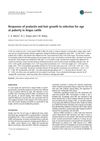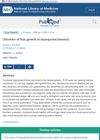Search
for
Sort by
Research
720-750 / 1000+ results
research Characteristics of Flutamide Action on Prostatic and Testicular Functions in the Rat
Flutamide combined with an LHRH agonist effectively inhibits prostate growth, suggesting it could treat prostate cancer.

research Impact of One-Week Administration of Dihydrotestosterone in Rat Anterior Pituitary Gland
Dihydrotestosterone changes some hormone-related gene expressions in rat pituitary glands but doesn't affect the estrous cycle.

research Expression of the RORα Gene in Inner Mongolian Cashmere Goat Hair Follicles
The RORα gene is active in different parts of cashmere goat hair follicles and may be influenced by melatonin, especially in December when hair growth changes.
research New Frontiers in Human Hair Follicle Neuroendocrinology
Human scalp hair follicles can produce and respond to several hormones, affecting hair growth and pigmentation.
research Acne and Sebaceous Gland Function
Effective acne treatments should reduce sebum, bacteria, and inflammation, with isotretinoin being the best for severe cases.

research S1 Opioid Receptor Agonists and Serum Prostate-Specific Antigen Level: Is There a Role for Prostate Cancer Control and Chemoprevention?
Opioid use may lower PSA levels, suggesting a possible role in prostate cancer control; PSA testing is useful for detecting prostate cancer; serum triglycerides are not linked to prostate cancer risk; and higher urethral PSA levels may be associated with local hormone activity.

research Different Levels of 5α-Reductase Type I and II, Aromatase, and Androgen Receptor in Hair Follicles of Women and Men with Androgenetic Alopecia
People with hair loss have more androgen receptors and enzymes in certain follicles, with men and women showing different patterns.

research Androgen Receptor Polymorphisms (CAG Repeat Lengths) in Androgenetic Alopecia, Hirsutism, and Acne
Shorter CAG repeats may cause hair and skin issues, while longer ones may link to acne.

research Activation of Transient Receptor Potential Vanilloid-3 Inhibits Human Hair Growth
Activating TRPV3 stops human hair growth.

research Key Targets of Hormonal Treatment of Prostate Cancer: The Androgen Receptor and 5α-Reductase
Blocking DHT production more strongly may help control advanced prostate cancer and improve quality of life.

research Evaluation of Androgen Receptor Gene as a Candidate Gene in Female Androgenetic Alopecia
AR gene not major factor in female hair loss; different from male hair loss.

research Estrogen Receptor Evaluation in Pomeranian Dogs with Hair Cycle Arrest (Alopecia X) on Melatonin Supplementation
Melatonin helped some Pomeranian dogs regrow hair, but it wasn't linked to estrogen receptors.

research Association of Gly972Arg Variant of Insulin Receptor Substrate-1 and Gly1057Asp Variant of Insulin Receptor Substrate-2 with Polycystic Ovary Syndrome in the Chinese Population
The IRS-2 Asp/Asp genotype may increase the risk of PCOS in Chinese women, especially if they are not obese.

research Responses of Prolactin and Hair Growth to Selection for Age at Puberty in Angus Cattle
Selecting Angus cattle for earlier puberty lowers prolactin levels but doesn't affect hair growth.

research A 12-Week Treatment with the Long-Acting Glucagon-Like Peptide 1 Receptor Agonist Liraglutide Leads to Significant Weight Loss in a Subset of Obese Women with Newly Diagnosed Polycystic Ovary Syndrome
Liraglutide caused significant weight loss in some obese women with PCOS, especially those with severe obesity and insulin resistance.

research Diffuse Hair Loss Associated With Hyperprolactinaemia: Report of Three Cases
High levels of prolactin in the blood can be linked to widespread hair loss.
research Involvement of Neurosteroids in the Control of Prolactin Secretion in Sheep Under Basal, Stressful and Pregnancy Conditions
Neurosteroids affect prolactin levels in sheep differently depending on stress and pregnancy conditions.

research Female Pattern Hair Loss: Beyond an Androgenic Aetiology?
Estrogen and prolactin may play bigger roles in female hair loss than previously thought.
research Clinical Manifestations of Hyperandrogenism and Ovulatory Dysfunction Are Not Associated with His1058 C/T SNP (rs1799817) Polymorphism of Insulin Receptor Gene Tyrosine Kinase Domain in Kashmiri Women with PCOS
The genetic variant studied does not affect PCOS symptoms in Kashmiri women.

research Prolactin and Hyperprolactinemia in Female Reproductive Endocrinology – An Update
Too much prolactin can cause menstrual problems, infertility, and sexual issues in women.

research Ligand-Independent Regulation of the Hairless Promoter by Vitamin D Receptor
Vitamin D receptor can control the hairless gene linked to hair loss even without vitamin D.

research Retinoic Acid-Related Orphan Receptor Alpha May Regulate the State of Hair Follicle Stem Cells by Upregulating the Expression of BNIP3
RORA may help regulate hair growth by affecting hair follicle stem cells.

research Indications for a Brain-Hair Follicle Axis: Inhibition of Keratinocyte Proliferation and Up-Regulation of Keratinocyte Apoptosis in Telogen Hair Follicles by Stress and Substance P
Stress can cause hair loss by negatively affecting hair follicles and this effect might be reversed with specific treatments.

research Estrogens and Human Scalp Hair Growth: More Questions Than Answers
The effects of estrogen on human hair growth are unclear and need more research.

research Parenteral and Oral Cyproterone Acetate Treatment in Severe Hirsutism
Cyproterone acetate implants were more effective at reducing facial hair and improving skin in severe hirsutism than oral treatment.

research Disorder of Hair Growth in Hyperprolactinemia
High prolactin levels can cause skin and hair symptoms similar to those caused by hormone imbalances.

research Pharmacological Control of Reproduction in Dogs and Cats
Different drugs are used to manage breeding, prevent or end pregnancy, and treat reproductive issues in dogs and cats.

research Female Pattern Hair Loss: Beyond an Androgenic Aetiology?
Hair loss in women may have multiple causes, and eyebrow regrowth possible with specific injections.

research An Integrative View of Mammalian Seasonal Neuroendocrinology
The article concludes that better understanding gene regulation related to seasonal changes can offer insights into the mechanisms of seasonal timing in mammals.